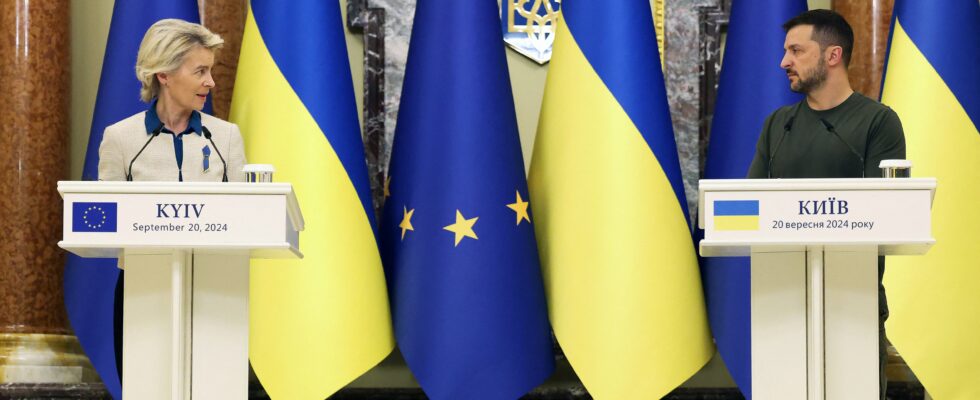The European Union is considering granting a loan of 35 billion euros to Ukraine, financed by the exceptional profits generated by Russian assets frozen in Europe, announced this Friday, September 20, the President of the European Commission Ursula von der Leyen in kyiv.
“I am pleased to announce that the Commission has adopted the proposals that will allow the European Union to lend 35 billion euros” to Ukraine, she said at a press conference alongside Ukrainian President Volodymyr Zelensky. “This is a huge step forward,” she added.
“We are now confident that we can grant this loan to Ukraine very quickly,” assured Ursula von der Leyen, who is in kyiv to prepare the EU’s support as winter approaches. EU member states still have to approve this proposal but the procedure will be accelerated, said a European official, speaking on condition of anonymity. This loan is not subject to any conditions and can be directly integrated into the Ukrainian national budget, the same source indicated.
Between 2.5 and 3 billion euros per year
Some €200 billion of Russian assets were frozen in the EU after Russia invaded Ukraine in February 2022, around 90% of which are in Belgium, home to the international depository organisation Euroclear. The 27 reached an agreement in May to use the interest earned on these frozen assets from the Russian central bank, which are expected to generate between €2.5 billion and €3 billion a year, to help arm Ukraine and finance its post-war reconstruction. The G7 countries then agreed on a global loan of up to €50 billion for Ukraine, financed by the interest earned on these frozen Russian assets.
The decision was difficult to implement, however, because of the guarantees requested by the United States. Washington wanted to ensure that the freezing of Russian assets would be carried out over time to avoid any disruption to financing.
This freezing of Russian assets in Europe depends on a sanctions regime that the 27 must renew every six months. The Commission has therefore proposed that this renewal of the sanctions relating to the freezing of the assets of the Russian central bank should now be done every three years.
Helping Ukraine as winter approaches
Ursula von der Leyen had earlier said she was in kyiv on Friday to discuss Europe’s “support” for Ukraine ahead of a difficult winter due to energy shortages caused by Russian bombing of infrastructure. “My eighth visit to Kiev comes as the heating season approaches and Russia continues to attack energy infrastructure,” she wrote on X upon arriving in the Ukrainian capital.
At her press conference, Ursula von der Leyen assured that the EU would help Ukraine “keep the lights on, keep your people warm and keep your economy going”. She said the Union would help Ukraine “repair” the damage from the Russian strikes and would export electricity to the country. This support should cover “25%” of Ukraine’s needs for the winter, the EU official estimated. Europe remains a crucial support for Ukraine, which faces a larger and better-armed Russian army.
